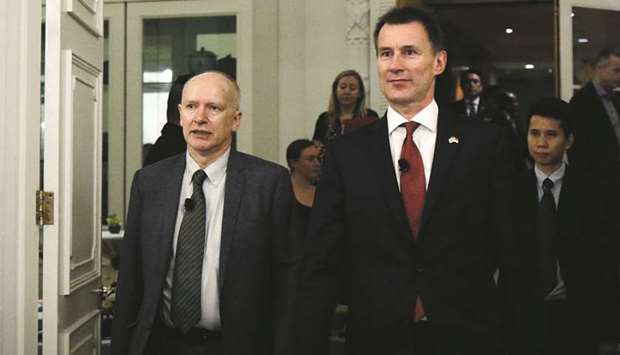The European Union has no plans for further Brexit talks, a spokeswoman has said, rebuffing British hopes of more assurances on the contested Irish backstop.
Theresa May has been ringing EU leaders ahead of this month’s meaningful vote in the House of Commons, but her Christmas holiday telephone diplomacy does not appear to have blunted EU resolve to avoid further Brexit negotiations.
“The deal that is on the table is the best and only deal possible and the EU27 leaders confirmed on December 13 (at an EU summit) in their conclusions that it will not be renegotiated,” a commission spokeswoman said yesterday.
“As I understand for now, no further meetings are foreseen between the (European) commission’s negotiators and the UK’s negotiators, as negotiations have indeed concluded.”
An EU source said nothing had happened regarding Brexit over the last 10 days, though May had spoken with the head of the European council, Donald Tusk, on Wednesday. The prime minister spoke to the German Chancellor, Angela Merkel, twice during the holiday period.
Jean-Claude Juncker, the European Commission president, does not appear to have been on the list of May’s Christmas calls, but the commission spokeswoman said he was “always available to listen to Prime Minister May’s views with regards to the temporary nature of the backstop”.
The British government is pushing for further guarantees on the Irish backstop, the fallback plan to prevent a hard border returning to the island of Ireland, which is an integral part of the 585-page Brexit withdrawal agreement.
The Foreign Secretary, Jeremy Hunt, told the BBC on Wednesday that the government needed more certainty the UK would not be trapped in the backstop indefinitely. “We’re not asking for anything new, but we are asking you to define what temporary means so we can have confidence we’re not going to be trapped in the customs union forever,” Hunt said.
The EU’s reluctance to reopen talks is not just a holding line over the Christmas holidays but reflects the deeply held view among officials that the bloc has gone as far as it can in offering reassurance on the backstop.
At an EU summit in December, EU leaders agreed that the backstop would “apply temporarily unless and until it is superseded by a subsequent agreement” to ensure that a hard border would be avoided. The text also stated that if the backstop were triggered, EU negotiators would use “best endeavours” to negotiate a replacement agreement.
EU officials say this document has significant legal weight because it is the formal conclusions of a European summit. None think that a different legal format – for example, depositing the text on the backstop at the United Nations – would make any difference to the chances of the Brexit withdrawal deal passing the House of Commons.
“There is a general frustration with the whole process. We have worked very hard for the last 18 months,” said one EU source. “We have compromised, we have done a lot to get this nailed down on time.” EU leaders were said to be irritated by May’s remarks at the December summit that British MPs did not trust the EU.

Foreign Minister Jeremy Hunt arrives to speak about u201cBritain’s Role in a Post-Brexit Worldu201d at the Fullerton Lecture in Singapore.
